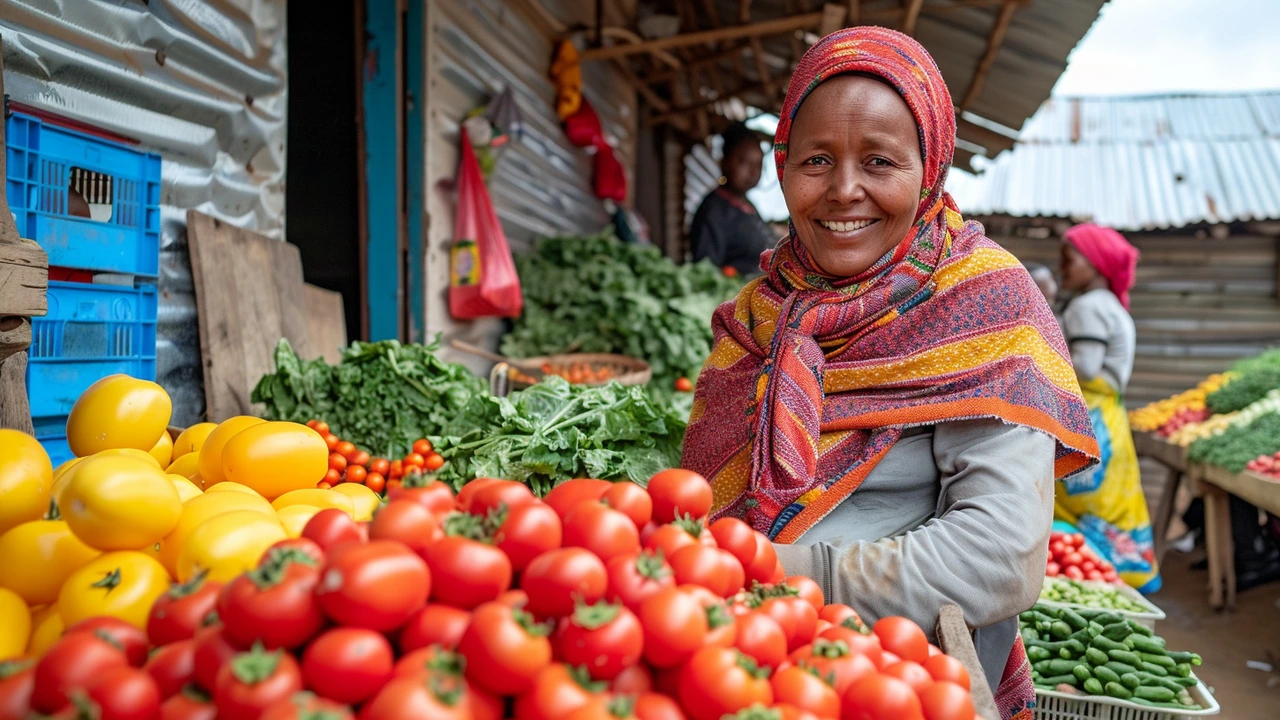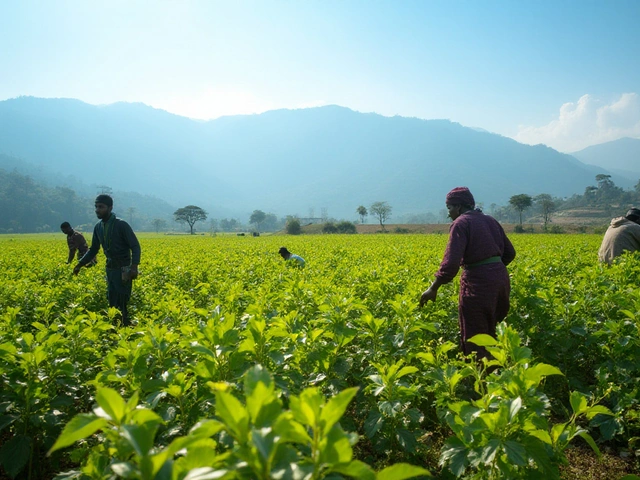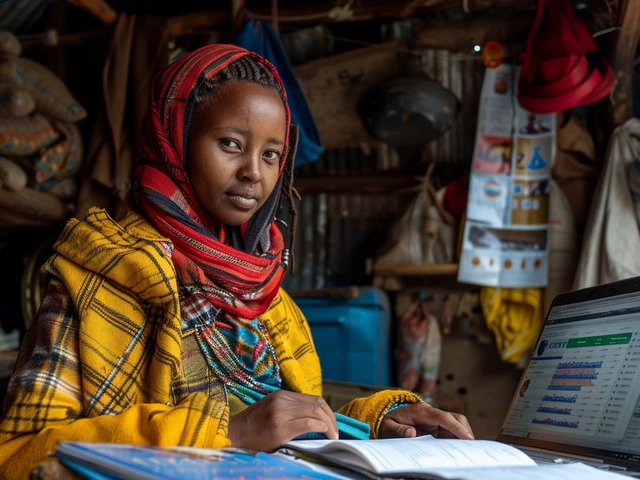Delving into the economic fabric of Ethiopia reveals a vibrant blend of traditional practices and modern innovations. Agriculture, which has been the backbone of the Ethiopian economy, still plays a crucial role today. However, the scene is rapidly changing with the adoption of modern techniques and the influx of technology.
In urban areas, a different economic narrative unfolds. Small businesses and startups are mushrooming, powered by a youthful demographic eager to innovate. Furthermore, digital platforms are creating new avenues for making money, some of which are explored later in this article.
- Agricultural Endeavors
- Urban Economic Activities
- Digital Opportunities
- Practical Tips and Considerations
Agricultural Endeavors
Agriculture in Ethiopia is more than just a means to sustain life; it's a rich tapestry that weaves together the country’s culture, economy, and identity. Farms spread across the extensive landscape of the country, ranging from smallholder plots to large-scale commercial farms. The majority of Ethiopia's workforce is engaged in agricultural activities, with coffee, the crown jewel of its exports, leading the charge. The nation is one of the top coffee producers globally, and the cultivation of these coveted beans provides a livelihood for millions.
The diversity of Ethiopia’s climate zones allows for the cultivation of a variety of crops. Beyond coffee, other significant crops include pulses, oilseeds, cereals, potatoes, sugarcane, and vegetables. Each of these crops plays a fundamental role in both domestic consumption and international trade. Farmers employ a mix of traditional methods that have been passed down through generations and modern farming techniques, adapting to changing climates and markets.
Government and NGO initiatives have played a critical role in supporting the agricultural sector. Through training programs, farmers learn improved agricultural practices that enhance yield and sustainability. These programs often include lessons on soil health, crop rotation, and efficient water use. Such efforts are crucial in a country where agriculture is not merely business but a way of life intertwined with the environment and its cycles.
Despite its pivotal role in the Ethiopian economy, agriculture faces significant challenges. Issues such as land degradation, outdated farming techniques, and frequent droughts threaten its sustainability. Addressing these challenges requires continuous support and innovation. The use of modern technology and sustainable farming practices is increasingly viewed as essential for future growth. This sector’s resilience and adaptation are pivotal not only for food security but also for economic development.
Urban Economic Activities
The urban landscape of Ethiopia is increasingly becoming a hotbed for diverse economic activities, driven by a burgeoning population and greater connectivity to global markets. Cities like Addis Ababa, Dire Dawa, and Gondar are seeing a significant transformation as youths and seasoned entrepreneurs alike are stepping into various sectors, looking to capitalize on new opportunities. The rise of the service sector, particularly in areas like IT services, hospitality, and retail, marks a shift from traditional to more dynamic and service-oriented economic practices.
One of the fastest-growing areas is the technology sector. Young tech enthusiasts and professionals are launching startups that not only serve the local market but also aim for a broader reach, targeting other African countries and beyond. This tech boom is supported by the government’s push towards creating a digital economy. Initiatives such as the establishment of tech hubs and incubators provide critical support infrastructure and mentorship, nurturing the next generation of tech pioneers.
The retail industry, too, has seen a makeover with the advent of modern shopping malls and online shopping platforms. This evolution from traditional markets to digital commerce is accelerating consumer spending and is reshaping consumer behavior in urban centers. E-commerce, although still in its infancy, is poised for significant growth, given Ethiopia’s improving internet penetration rates. This digital transition presents an abundance of opportunities for local entrepreneurs to reach a wider audience.
Interestingly, the hospitality sector is also on the rise, spurred by both local demand and an increase in tourism. Hotels, restaurants, and travel services are expanding, supported by the government's initiative to promote Ethiopia as a prime travel destination. The influx of tourists not only bolsters the hospitality industry but also stimulates a broader economic activity, impacting various sectors including local crafts and entertainment.
It’s important to emphasize that while the urban economic landscape offers numerous opportunities, it also comes with challenges such as market saturation and high competition. Entrepreneurs need to be innovative and well-informed about market needs to succeed. Strategic planning and understanding of consumer behavior are crucial in navigating the urban economic terrain.
Digital Opportunities
As Ethiopia continues to stride forward in the digital era, there's a noticeable surge in opportunities that leverage information technology and the internet. Despite challenges like internet penetration which stood at just around 20% in recent years, initiatives to improve connectivity are steadfast. This digital landscape presents several avenues for both city dwellers and rural folks alike. The growing trend is increasingly tilting towards digital platforms that facilitate everything from e-commerce to remote learning, reflecting a significant transformation in how business and education are approached.
Particularly gripping is the rise of e-commerce platforms in Ethiopia. A standout example is the proliferation of mobile money solutions which, similar to many parts of Africa, provide essential financial services to those otherwise excluded from the traditional banking system. Such platforms not only boost financial inclusion but also stir economic activity by enabling small scale traders to expand their reach. This kind of digital entrepreneurship epitomizes the new wave of income-generating activities that many Ethiopians are swiftly capitalizing on.
Another fascinating development is in the field of freelance digital work. With the global market increasingly incorporating remote work, educated youths in Ethiopia have found opportunities offering their skills in coding, web design, and content creation to clients across the world. This is not just about individual earnings but about fostering a high-tech economy which could be vital for the country’s future on the global stage. Countries witnessing significant digital growth tend to have initiatives supporting tech education and digital skills training—something Ethiopia is gradually but proactively working on.
The government, too, is playing a role in this digital advancement. Recent policy reforms underscore a commitment to embracing digital technology to spur economic growth. Government services are increasingly being digitalized, an effort that not only improves efficiency but also makes government more accessible to the populace at large. In line with these advancements, digital literacy and access to technology are becoming priorities in educational and development policies.
Practical Tips and Considerations
When considering ways to tap into Ethiopia's economic opportunities, it's crucial to take into account several practical aspects. First and foremost, understanding the local market is key. Whether you're looking to engage in agriculture, start a tech venture, or run a small shop, knowing the needs and wants of the local population can give you a significant advantage. Detailed research and interaction with the community can provide valuable insights into what products or services might thrive.
Another critical factor is navigating the regulatory and financial landscapes. Ethiopia, like any country, has its own set of rules and regulations that govern business operations. From registration and licensing to tax obligations, getting acquainted with these regulations is essential for smooth operations. Engaging local legal and financial experts might incur some initial costs but tends to save a lot of potential trouble and confusion later on.
Financial planning is also pivotal. Many businesses falter not due to a lack of demand but because of poor financial management. Budgeting, forecasting, and adequate initial funding are the cornerstones of a sustainable business. It's wise to consider various funding options available in Ethiopia, including loans from local banks, partnerships, and even international grants for entrepreneurial ventures.
Marketing strategies should not be overlooked. In a world where digital presence is increasingly important, having a strong online and offline marketing plan can set you apart from competitors. Utilizing social media platforms, which have seen rising usage in Ethiopia, can be a cost-effective way to reach a broad audience. Traditional methods like local radio advertisements and community events continue to hold high efficacy as well.
Lastly, resilience and adaptability are traits that must be woven into the fabric of your business operations. The Ethiopian market is dynamic, with frequent shifts in consumer behavior, market conditions, and even regulatory frameworks. Being able to adapt to these changes, and possibly even anticipate them, can provide a critical edge. Flexibility in business processes and the willingness to pivot when necessary are invaluable in maintaining relevance and profitability in the ever-evolving Ethiopian economic landscape.

 Travel Safety in Ethiopia: Current Insights for 2024
Travel Safety in Ethiopia: Current Insights for 2024
 Most Common Jobs in Ethiopia Revealed
Most Common Jobs in Ethiopia Revealed
 Bringing Cash into Ethiopia: Limits and Tips for Travelers
Bringing Cash into Ethiopia: Limits and Tips for Travelers
 Top Ways to Earn Money Online in Ethiopia: A Comprehensive Guide
Top Ways to Earn Money Online in Ethiopia: A Comprehensive Guide
 Exploring the Beauty of Ethiopia: A Traveler’s Guide to Its Unique Attractions
Exploring the Beauty of Ethiopia: A Traveler’s Guide to Its Unique Attractions
love monster
May 6, 2024 AT 17:42Digital platforms are reshaping Ethiopia's economic landscape by lowering entry barriers for small traders. Mobile money services, for instance, let vendors accept payments without a traditional bank account, which fuels cash flow and expands market reach. Likewise, e‑commerce sites give artisans a storefront that can attract buyers from Addis to Nairobi with just a click. The integration of data analytics helps farmers predict demand and adjust planting cycles, turning age‑old practices into data‑driven decisions. In short, the tech stack is becoming the new backbone of income generation.
Christian Barthelt
May 7, 2024 AT 07:35The article glosses over the fact that Ethiopia's internet penetration remains under 20 percent, which hardly qualifies as a digital boom.
Ify Okocha
May 7, 2024 AT 18:42While the piece paints a rosy picture of digital growth, it conveniently omits the chronic power outages that cripple online businesses. Rural entrepreneurs still wrestle with unreliable electricity, making any reliance on internet services a fragile endeavor. Moreover, the regulatory environment remains opaque, with sudden policy shifts that can shutter a startup overnight. The narrative also ignores the steep learning curve for many who lack basic digital literacy, turning potential opportunities into dead ends. In essence, the optimism feels more like wishful thinking than grounded analysis.
William Anderson
May 8, 2024 AT 03:02The tech hype sounds like a circus act, yet the real grind is far less glamorous. Start‑ups sprint for funding while ignoring the fundamentals of product‑market fit. Investors are dazzled by buzzwords, not sustainable revenue. Ultimately, many of these ventures fade before they even find a customer.
Sherri Gassaway
May 8, 2024 AT 09:58One might contemplate the symbiotic relationship between tradition and innovation, recognizing that progress need not erase heritage. The agricultural sector, steeped in generational knowledge, stands to gain from selective modernization. By honoring ancestral practices while incorporating precision tools, a balanced pathway emerges. It invites a dialogue between elder farmers and youthful technologists, fostering mutual respect.
Milo Cado
May 8, 2024 AT 15:32It's inspiring to see how digital tools are empowering everyday Ethiopians to create new income streams 😊. The rise of remote freelance work, especially in coding and design, opens doors that were unimaginable a decade ago. Keep sharing these success stories; they motivate many to explore their own potential 🚀.
MONA RAMIDI
May 8, 2024 AT 19:42Seriously, who even thinks this is groundbreaking?
grace riehman
May 8, 2024 AT 23:02i love how the article highlights both old school farming and new tech vibes it shows that change can happen without losing our roots.
Vinay Upadhyay
May 9, 2024 AT 01:48Ah, the classic “power outage” excuse-always the villain in every startup story. Sure, electricity flickers, but so did the lights in the first factories, yet they still produced goods. Meanwhile, innovators are crafting solar‑backed kiosks that keep the lights on during the darkest hours. If the narrative were any more dramatic, we'd need popcorn.
Eve Alice Malik
May 9, 2024 AT 04:02That tech stack you mentioned is exactly what my cousin uses to sell coffee beans online, and it's been a game changer. He now ships orders across the continent without ever leaving his hometown. It's proof that even simple digital tools can boost real income.
Debbie Billingsley
May 9, 2024 AT 08:12Ethiopia's agricultural sector remains the cornerstone of its GDP, contributing roughly 30 percent annually. Coffee alone accounts for a significant share of export earnings, positioning the nation among the top global producers. Yet, reliance on a single commodity exposes the economy to price volatility on international markets. Diversification into pulses, oilseeds, and horticulture can mitigate these risks while enhancing food security. Sustainable farming practices, such as intercropping and conservation tillage, improve soil health and reduce erosion. Investments in irrigation infrastructure are essential to counteract recurrent droughts that threaten yields. Moreover, access to credit enables smallholder farmers to purchase quality inputs and adopt improved seed varieties. Government extension services play a vital role in disseminating agronomic knowledge, but their reach must be broadened to remote regions. Partnerships with NGOs have demonstrated success in training farmers on climate‑smart techniques. In addition, value‑addition enterprises, like coffee roasting and spice processing, can capture higher margins locally. Export logistics, however, remain a bottleneck due to limited port capacity and inadequate road networks. Streamlining customs procedures would accelerate market access for agricultural products. Finally, aligning agricultural policies with climate change mitigation goals ensures long‑term resilience for Ethiopia's farming communities.
Patrick Van den Berghe
May 9, 2024 AT 09:52Great points but we need faster ports.
Josephine Gardiner
May 9, 2024 AT 11:48Observing the integration of digital solutions with traditional sectors suggests a hybrid model that could sustain growth. The emphasis on training programs aligns with capacity‑building objectives, ensuring that technology adoption does not outpace skill development. Moreover, the collaborative efforts between government and NGOs provide a scaffold for scalable interventions. Such a framework may serve as a blueprint for other emerging economies seeking balanced modernization.
Jordan Fields
May 9, 2024 AT 13:12Agricultural diversification is key to Ethiopia's resilience.
Divyaa Patel
May 9, 2024 AT 18:45In the grand tapestry of progress, every thread of tradition intertwines with the neon glow of innovation. When a farmer looks up at a satellite‑linked weather app, he is not abandoning his ancestors but conversing with them through a new dialect. This dialogue, however, demands humility-a willingness to listen to both the rustle of wheat fields and the hum of servers. If we cherish only the loudest voices, we risk silencing the quiet wisdom that has fed generations. Let us therefore celebrate the symphony of old and new, lest we lose the melody altogether.
Larry Keaton
May 9, 2024 AT 21:15While your casual tone is nice, the reality is that many farmers lack the infrastructure to even consider tech adoption. Ignoring those gaps does a disservice to the community.
Liliana Carranza
May 10, 2024 AT 00:18That optimism is contagious! 🌟 Keep shining a light on these success stories, and more people will be inspired to take that first digital step. 💪
Jeff Byrd
May 10, 2024 AT 04:28Congratulations on spotting the obvious. Next time, perhaps you’ll also notice the missing internet cables.